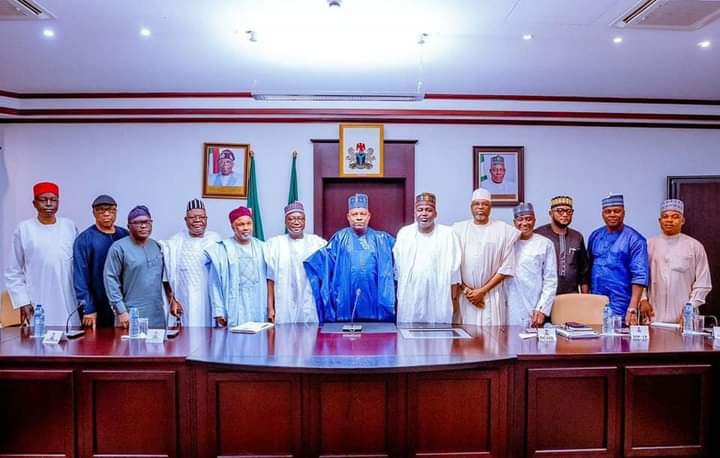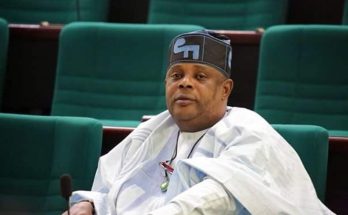The Revenue Mobilisation Allocation and Fiscal Commission (RMAFC) has said the present economic realities in the country would not allow for an upward review of the salary of President Bola Tinubu and his ministers.
This is coming as experts faulted the 25.8 per cent inflation rate for August as recently released by the National Bureau of Statistics (NBS).
RMAFC Chairman Muhammed Shehu made the clarification Sunday while speaking to journalists in Abuja.
His position followed criticisms that trailed his earlier statement that the commission would carry out 114 per cent upward review of the salaries of political office holders at a time many Nigerians repeatedly called for a massive reduction in the cost of governance.
According to the 2023 budget of N21.83 trillion, recurrent expenditure has the highest allocation of N8.33 trillion, representing nearly 40 per cent of the budget.
RMAFC explains
But addressing journalists in Abuja, Shehu said Nigeria’s present financial realities would make such an exercise undesirable.
With revenue from oil on the decline, coupled with the country’s microeconomic fundamentals trending downwards, many Nigerians questioned the rationale of the commission in wanting to carry out the exercise.
Notwithstanding, the RMAFC boss said: “We are Nigerians, we are not going to start talking about reviewing salaries of political office holders now because of the challenges that the government is facing.
“As a commission, we are going to do our work but we are not going to say we will do it now.
“We will do it when the climate is right and then we will take it forward to the stakeholders for them to decide on what to do.”
On the actual figure of president and ministers’ salary, he said: “I want to disabuse the minds of Nigerians. It is not true that people are getting jumbo salaries.
“The monthly salary of Mr President is less than N1.5 million; that of a minister is not even up to one million naira.
“I know of an average CBN worker that is not even a director, who earns more than a minister.
“People in NNPC, NCC, Port Authority earn huge salaries. What is the salary of a governor? What is the salary of a legislator?”
The RMAFC chairman further explained that what people call jumbo pay is the operational cost of running an office.
According to him, political officeholders do not earn outrageous salaries.
The RMAFC chairman said what is considered outrageous earnings are statutory office running costs, which should ordinarily be managed centrally by the National Assembly Service Commission (NASS).
“I know some people will say members of the National Assembly get up to 10 million or 11 million monthly.
“Those are not salaries; they are like operating costs of running their offices which in other societies the legislator does not have to see because there is a structure.
“Once you get elected, you make that structure from your constituency office to computers to logistics to the size of your constituency.
“Wherever you have constituency office, the workers you hire, it is the National Assembly Service Commission that is supposed to take care of that.”
He said the Nigerian system allows a legislator to be allocated a certain amount, which is spent and the receipts retired.
Experts fault NBS on inflation
Meanwhile, experts have questioned the 25.8 per cent inflation rate for August as recently released by the National Bureau of Statistics (NBS).
In its Consumer Price Index (CPI) report for the month of August 2023, the NBS’ headline inflation rate increased to 25.80 per cent relative to the July 2023 headline inflation rate which was 24.08 per cent.
According to the bureau, it showed a 1.72 percentage point increase when compared to the July 2023 headline inflation rate.
On a year-on-year basis, the headline inflation rate was 5.27% points higher compared to the rate recorded in August 2022, which was 20.52%.
The NBS noted that food inflation for August rose to 29.34 per cent in August 2023, representing a 2.35 percentage point increase from 26.98 per cent recorded in the previous month, on a year-on-year basis, which was 6.22% points higher compared to the rate recorded in August 2022 (23.12%).
…Outdated Data
Speaking on the figure, Chief Executive Officer (CEO) Financial Derivatives (FDC) Limited Bismarck Rewane said the inflation figures released by the NBS was not a true reflection of market reality.
This, he said, was because of the outdated nature of the inflation basket and appropriateness of sampling procedure used in survey.
Rewane, in the FDC’s bulletin on inflation Saturday, said Nigeria needs an updated inflation basket as using incomplete information would lead to policies that would produce suboptimal outcomes.
He said: “While it is true that inflation is increasing, the official data is not a true reflection of market reality. One reason for this is the outdated nature of the inflation basket and the appropriateness of the sampling procedure used in the inflation survey.
“Ideally, the Consumer Price Index (CPI) basket should be reviewed every five years to capture changing consumption patterns. However, the Nigerian inflation basket was last reconstituted in 2009.
“Our synthetic basket shows that the average increase in the general price level is about 45 per cent. The bigger problem is that policies based on flawed or incomplete information would lead to suboptimal outcomes.
Factors responsible for the rise in inflation are wheat with price increase of 43 per cent to N38, 000, rice with 91 per cent increase to N61,000, palm oil with 55 per cent increase to N31,000, sugar with 75 per cent to N42,000 and tomatoes with 82 per cent increase to N40,000.”
Urban inflation at 27.69 per cent and rural at 24.1 per cent leaving a difference of 3.5 per cent from 3.34 per cent in July.
Inflation was highest in Kogi at 31.5 per cent, Lagos at 29.17 per cent and Rivers 29.06 per cent.
The rate was lowest Sokoto at 20.91 per cent, Borno at 21.77 per cent and Nasarawa at 22.25 per cent.
Analysts at Afrinvest sees inflation outlook remaining bleak due to the impact of unfavorable base they believe it would mask expected harvest haul that usually starts at September. So expects farm inflation to soften to 2.8 per cent month-on-month (m/m) but worsen to 31.1 per cent year-on-year (y/y).
…It’s underreported- Don
Also speaking, an associate professor of management and finance at the Baze University, Abuja, Dele Olaolu, told Blueprint that NBS was underreporting the country’s inflation rate.
According to him, the fundamentals used in computing the rates were obsolete and did not meet present day realities.
“I am tempted to agree with that position too. The reality today is that over 90% of the fundamentals used by NBS to compute the inflation rate are stall and does not meet the realities of today. For example, what was the oil price in 2009 & what is it today? What was the exchange rate in 2009 & what is it today? Also, what was the price of PMS in 2009 compared to 2023 and what were the prices of foodstuffs in 2009 compared to 2023?
“Experts including Professor Uche Uwaleke has canvassed over the years and suggested to NBS that those parameters and templates are too old and should be changed. In fact, I am tempted to believe that Nigeria’s real inflation rate is understated if all the parameters and economic indices including other extra generous factors are factored in its computation. If Ghana’s inflation rate is at over 52 per cent as at August, 2023, then Nigeria’s inflation rate must be way more than 25.8% that’s being reported,” said the university teacher.
…Need for new methodology
For an economist Adefolarin Olamilekan, there is a need for the statistics bureau to adopt a new methodology to enable policy makers take accurate decision.
This, he said, would help resolve the root causes of inflation either on the short to medium term or long term basis.
Olamilekan said: “Arguably, there is an urgency for a rethink on how NBS conducts its CPI to arrive at our national inflation figures. Rejigging the entire methodology will go a long way to make the report more acceptable, simple and market-reflective because it will take cognizance of all items that are not just locally impacting on the economy, but internationally transmitted into our economy.
“Essentially, if we want to tackle inflation in Nigeria, we have only been able to treat the symptoms not the real cause. And we can attribute this to reports NBS has been releasing over the years based on the sampling and recommendations.
“Consequently, it’s time for the Nigerian authority to fight inflation with a tripod of monetary, fiscal and trade policies, in collaboration with sub-national government.”




